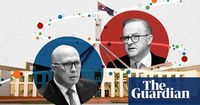The landscape of political accountability in Australia is facing unprecedented challenges as the country gears up for the 2025 federal election. This election marks the first without the ABC RMIT Fact Check, a significant source of political oversight since its inception during the Rudd-Abbott election in 2013. With the backdrop of increasing misinformation and the advent of generative AI tools, the stakes for voters have never been higher.
The dissolution of the fact-checking partnership between the ABC and RMIT University in 2024 occurred amidst a fiery debate surrounding the Indigenous Voice to Parliament referendum. This exit from vital fact-checking provisions may have profound implications as Australians head to the polls again. In 2025, voters will have to navigate a complex and fast-evolving landscape where misinformation is rampant, and AI-generated content is emerging as a significant player.
“The crisis is driven in part by politicians’ denigrations of online investigative research activities, which is related to distrust of the fact-checking movement by far-right politicians and their allies around the world,” noted the analysis by Crikey. This sentiment underscores the worrying trend in Australia towards skepticism of factual discourse, which poses a danger in democratic settings where voters rely on accurate information to make informed decisions.
Compounding these issues, at the start of 2025, Meta announced that it would discontinue its third-party fact-checking program in the United States while simultaneously altering its content moderation policies. These changes will further complicate the already precarious relationship between accurate information dissemination and political messaging. The ramifications of these decisions appear to ripple across other jurisdictions, including Australia, where misinformation continues to thrive.
There is an urgent need for independent and credible fact-checking outlets to reinstate integrity within public discourse. Currently, Australians can still rely on the ABC News Verify and the Australian Associated Press (AAP) fact-checking service. However, the suspension of RMIT Fact Lab’s membership from Meta’s third-party fact-checking program casts a long shadow over its credibility and highlights the fragility of the fact-checking landscape.
For the first time since the emergence of tools like ChatGPT in political campaigning, voters are witnessing a flood of AI-driven advertisements that blur the lines between reality and fabrication. AI's influence is alarming; it promises to streamline communication but simultaneously raises concerns about deceiving or manipulating voters. These practices could potentially undermine overall public trust in electoral systems.
“In Australia, there is the potential for future political dealmaking between influencers or power brokers, platform owners like Musk and Zuckerberg and segments of the Australian elite,” cautioned the analysis. This commentary highlights the risk of entangled interests within the information ecosystem, which could further confuse the electorate and erode democratic values.
As the election approaches, polls indicate a notable shift in voter sentiment. According to the latest Roy Morgan Poll, if a federal election were held today, the Australian Labor Party (ALP) would be returned to government with an increased majority of 53%, slightly ahead of the Liberal-National Party (LNP) coalition at 47%. This statistic illustrates shifting allegiances among voters, shaped not only by traditional campaign strategies but also increasingly by the broader narratives being propagated online.
Despite the apparent support for the ALP, Government Confidence is on the decline. Government Confidence weakened, down 4.5 points to 80, a troubling sign when compared to previous electoral activities. This drop comes on the heels of perceived failures in addressing key issues like inflation and consumer confidence, with confidence hovering at a dismal 84.2.
Furthermore, the expectations around inflation are on the rise again, with Australians anticipating an inflation rate of 4.9% over the next two years. As household budgets stretch under financial pressure, rising mortgage stress adds another layer of complexity. The recent statistics estimate that 1.55 million Australians, or 27.7% of those with mortgages, are 'at risk' of mortgage stress—a scenario that could present significant challenges for any government in power post-election.
As Australians prepare to cast their votes, they will do so under conditions of heightened misinformation and declining trust in traditional media. This juxtaposition presents a call to action for political parties, demanding not just ethical considerations surrounding their use of AI in campaigning but also for better-designed human-AI detection tools, which could empower voters to discern fact from fabrication.
With the implications of a digital misinformation crisis looming large, the expectation is for renewed commitment to political accountability and a future for fact-checking systems that align with the evolving media landscape. The time for political parties to advocate for transparency in information dissemination has arrived, and there is no better time to hold them accountable than this election season. Ultimately, safeguarding democracy while ensuring informed citizenry is paramount as Australia navigates through this pivotal moment.


